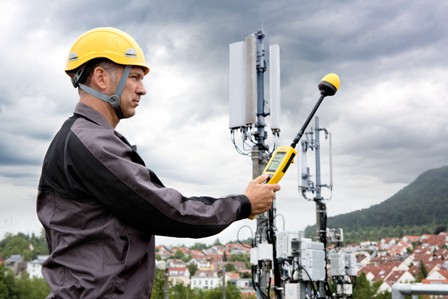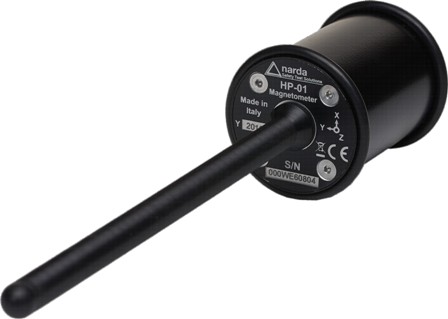Whatever technical challenges may arise from the next generation of mobile communications, Narda has the perfect measurement solutions right now. With its NBM-550 field strength meter and unique range of interchangeable probes, the company already covers the entire frequency range between 0 Hz and 90 GHz with reassuring margins in reserve. As the test phase for 5G begins in 2018, this outstanding level of planning security is very welcome.
Pfullingen, December 08, 2017 –

measure field strength when working on transmission masts.
Standards-compliant EMF measurement solutions (for electrical and magnetic fields) from Narda STS ensure customers are fully equipped for the future – including 5G. With outstanding flexibility and suitable for virtually all applications – especially in the frequency range above 6 GHz – users of the NBM-550 (Narda Broadband Field Meter) can enjoy the benefits of tomorrow’s advanced technology today. Standardscompliant meters from Narda stand for high quality, reliability, lasting safety and state-of-theart technology. All instruments comply with key national and international standards and directives. These are the EMF Directive 2013/35/EU (occupational health and safety), IEC 6186-1 (requirements relating to the meters) and DIN EN 50413 (basic standard for the measurement and calculation process).
New: HP-01 – Reliable measurement of high static magnetic fields in the workplace
The new HP-01 magnetometer launched at the beginning of November 2017 is the new interchangeable isotropic probe for the NBM-550. It offers frequency-selective analysis of static and time-variable magnetic fields from 0 Hz (DC) to 1 kHz and completes the portfolio at the lowest end of the spectrum. This newly developed magnetic field probe offers a high dynamic range of 120 dB and is thus highly recommended for use in occupational health and safety. It is ideal for evaluating field exposures in manufacturing industry workplaces with high static magnetic fields in accordance with the European Directive 2013/35/EU. The HP- 01 incorporates non-directional Hall effect sensors that cover an extremely wide measurement range from 10 µT to 10 T (Tesla – magnetic flux density) in a single device. The instrument can be controlled using the HP01-TS PC software solution (supplied) and from mid-2018 also via the NBM-550. 3/5 The magnetometer’s powerful FFT analyzer allows signal analysis in both the time and the frequency domains. Typical applications include safety measurements in the areas of magnetic resonance tomography (MRT) and electromobility, in electrolysis processes, magnetic stirrers and permanent magnets as well as DC motors and generators. Another area of rising significance lies in evaluating workplaces for the growing number of people with active implants. These areas are subject to much stricter exposure limit values.
Why does the NBM range make planning for the future so much simpler?
New additions to the range of products for the rugged Narda broadband field meters (NBM) include the EF 4091 (40 MHz to 40 GHz) and EF 9091 (100 MHz to 90 GHz) electrical field probes for measurement of field strengths in the millimeter wave band. These are designed to cover the high frequency bands of the future. The specialist in EMF measurement solutions offers a unique and comprehensive range of interchangeable isotropic HF probes for the NBM-520 and NBM-550 broadband meters. These cover frequencies up to 90 GHz and are therefore ideal for bands in the millimeter range. The importance of this area of the spectrum in safety measurement technology will increase dramatically over the next few years – and certainly with the launch of the next generation of mobile communication devices. In this situation, the user profits from an enormous choice of 15 different probes which can be selected for the specific application based on field type and frequency, dynamic range and the type of evaluation. These can be supplemented with additional probes whenever necessary. For example, for an individual frequency band, Narda also offers a second probe with an extremely wide adjustment range for high exposure level applications. This includes levels which are so high that even trained personnel cannot safely enter the field to measure it with a hand-held meter. Here, the measurement must be performed remotely. Only Narda offers this level of quality and flexibility. Customers can therefore supplement their meters with a suitable probe whenever requirements change. The NBM range is ideal for personal safety measurements in all areas. It is highly reliable, accurate and compliant with national and international standards as well as offering excellent level stability and immunity to interference. One of the key applications of these devices is measuring exposure levels in the workplace, e.g. in accordance with the European EMF Directive 2013/35/EU. In addition, the NBM-550 supports selective measurement of low frequency electrical and magnetic fields from 1 Hz to 400 kHz for the analysis and determination of exposure levels in the industrial, medical and electricity generation sectors.

magnetic fields from 0 Hz (DC) to 1 kHz was added to the Narda range at the beginning of
November 2017.
Example: Mobile communications
Network operators and manufacturers in the telecommunications sector fall into a variety of user groups with diverse needs. Some exclusively use the mobile communication frequencies which are transmitted or received via base stations and thus require only a 3 GHz or 6 GHz probe. Other users have to manage, for example, microwave point-to-point 4/5 antennas. These require probes which operate in the range up to 18 GHz or even 40 to 60 GHz. Narda has suitable meters to meet the current and future needs of all these target groups.
5G test networks and applications
In 2018, a number of test networks will go into operation to gather experience in working with the next generation of mobile communications known as 5G. This work is essential preparation for the roll-out of these services in 2020 although experts believe market maturity will be achieved from 2025. They are required not only for Internet access, which is increasingly becoming mobile, but also to boost data volume and capacity in mobile communication networks. These grew dramatically in 2017. The process of digital transformation is particularly obvious, e.g. in the Internet of Things (IoT) and the rapidly growing number of devices, sensors, actuators and machines which are networked with each other. These industrial and intelligent networks create completely new challenges for connectivity, capacity, security, safety and quality of mobile communication services.
5G – In from the start
In the area of safety, Narda plans to be involved in 5G from the very start with its state-ofthe-art meters. Naturally, these test networks are also a crucial step towards the launch of the 5th generation of mobile communication services because operators must first determine which measurement technologies they require. The area of safety is also a key part of this initial testing phase. As well as functional testing for commissioning, ensuring health and safety in the workplace as well as for the public are vital considerations.
Fit for the future
Narda already covers all the frequency bands from 700 MHz to 86 GHz and is thus wellequipped for 5G mobile communications. The SRM-3006 even permits selective measurements of individual services up to 6 GHz. However, the highest bit rates of up to 10 Gbit/s, promised for 5G, will primarily be achieved in the “high band” above 6 GHz as this offers greater bandwidth. The 26 GHz band, in particular, and the various bands in the millimeter band spectrum between 31 and 86 GHz will be used here for data transmission. Extensive testing will be essential because the complexity and technical challenges of mobile telecommunication systems and equipment increase rapidly for manufacturers as the frequency band rises Although the first test installations have already been built, the testing phase for 5G will really begin in 2018. Those users who choose the NBM with 90 GHz probe from Narda are sure to be well-equipped for all eventualities over the coming years. After all, as a manufacturer of measurement instruments, Narda STS currently offers products for all 5G systems including the highest frequencies – and this at an extremely early stage in the testing phase for these services.






